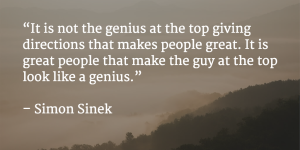Leaders Eat Last
Favorite quote from the author:

Here are my 3 takeaways from this summary:
- Safety means progress.
- Responsibility means actually caring about people.
- Technology has turned us into performance addicts.
All of these deserve a thorough explanation, so here goes!
Lesson 1: Safety means progress. And leaders provide safety.
Think about the last time you made a lot of progress on a fun little side project of yours. Where there was nothing to gain but the joy of doing it.
Were you worried about paying that month’s bills?
Probably not.
The reason you could focus entirely on making progress on something you care about, is because your basic needs were already secured in that particular moment. Had they not, it would’ve been unlikely you could spend 8 hours playing guitar without worrying about them.
Our brain always defaults to safety mode, and the reason is simple: it had to in the past, or we wouldn’t be here.
Today all of our safety problems revolve around money, but our ancestors had tons of safety issues. They had to run away from saber-tooth tigers, hide from enemies, avoid diseases, and oh, hunt and gather their own food and find a place to stay.
Progress only started occurring once they moved around in groups and delegated tasks. When John takes care of collecting berries, and Jason hunts some wild boar, while Jenny finds a nice cave, Joshua can spend all his time crafting a new spear.
That’s why a leaders job is to provide safety to his followers, so they can focus on making progress towards their shared vision. The bigger the circle of safety around the group, the faster the progress.
For example, Google draws a pretty awesome circle of safety around its employees. Free food, ask-any-question meetings and 20% time for your own experiments are a pretty safe environment to be in.
Once you’re not worried about avoiding threats, you can start improving.
Lesson 2: Responsibility means truly caring about other people, so don’t get detached.
Let’s say you manage the finances of your company. In that case, your responsibility might be to “allocate the budget in a way that maximizes profits”.
But in reality, it’s your job to make sure the money goes to the people that will use it the best. Maybe you want to shut down a division. If so, you’re not only shutting down a part of the company, you’re robbing people of their safety, by firing them from their jobs.
This doesn’t mean you should try to save everyone, but you have to be aware that the consequences of your actions as a leader directly impact the lives of people.
That’s why empathy is the most important trait of a leader. If you can really put yourself into other people’s shoes, you will truly care about them, and thus be worth for them to follow you.
It’s easy to get detached when companies grow, and when that happens the consequences of your actions seem less real. Often leaders will then make decisions at other people’s expenses.
For example in 2009 the Peanut Corporation of America knowingly shipped contaminated peanuts to maintain cashflow, causing a nationwide salmonella crisis.
Lesson 3: Technology has turned us into performance addicts, looking for the next dopamine hit.
Our ancestor Grok was really glad when that runner’s high kicked in on the last few yards before the cave, so he could jump to safety and not be eaten by a bear.
But today that’s not a big issue, which is why your dopamine cells have decided to reward you for great performance instead. Companies’ reward systems often work according to the mantra “More is always better.”, but sadly, each new sales record you set will make you feel less happy.
Instead of focusing on lasting value, we change the color of our profile picture on Facebook, or tweet something with a human rights hashtag, and feel really good for completing a task.
This is much easier than actually going out, for example by volunteering, and doing something about it, so our brain will settle for the “Like” on Facebook as a substitute.
This is addicting though and will only make you feel empty inside. So don’t hope for the next funny cat video, but do something that’s hard instead – you’ll feel a real sense of accomplishment afterwards.
What else can you learn from the blinks?
- How our happiness hormones created the first leaders
- Which company’s employees were so dedicated to their culture that they gave their lives for their customers
- Why more empathy could’ve saved hundreds of lives when the Titanic sank
- What happens when we dehumanize others
- The 2 most essential abilities of a leader
- How a great leader always serves his followers, even though he’s the one creating the vision
- Where the phrase “Leaders eat last” actually comes from
Who would I recommend the Leaders Eat Last summary to?
The 12 year old bully, who keeps forcing others to give him their lunch money, the 32 year old corporate consultant, who’s lost in charts and cash flow projections, and anyone who thinks a like on Facebook, Instagram, Twitter will change anything.

